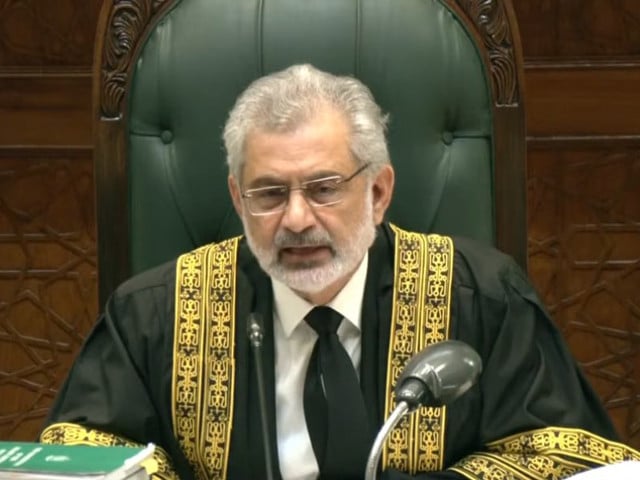Staff Report
ISLAMABAD: In a detailed minority judgment, Chief Justice of Pakistan Qazi Faez Isa on Tuesday stated that the implementation of the top court’s July 12 verdict in the reserved seats case was not binding as the review petitions in the case were still pending and not fixed for hearing.
The detailed note came days after the eight judges of the top court, in its second clarification, reiterat-ed that parliament’s amendment to the Elections Act does not have a retrospective effect and it can-not undo the SC’s judgment in the reserved seats case — a move that irked the top judge.
In his dissenting note, the CJP pointed out the “constitutional violations and illegalities in the majority’s short order of 12 July 2024, and the majority’s detailed judgment of 23 September 2024, the or-der/clarification of 14 September 2024 and the Clarification of 18 October 2024..”.
The CJP hoped that his colleagues in majority would “reflect and correct their mistakes” and ensure that Pakistan is governed in accordance with the Constitution.
In a detailed dissenting note, Justice Isa said that unfortunately, the review petitions against the ma-jority short order could not be heard because his colleagues — Justice Syed Mansoor Ali Shah and Jus-tice Munib Akhtar — outvoted him on the committee constituted under the SC Practice and Procedure Act, 2023.
He went on to say that the majority of eight judges decided to part ways with the court, comprising of thirteen judges, which had heard the appeals.
“The majority set up its own virtual court, permitted the making of ‘an appropriate application’ by the ECP and PTI, and directed that such appropriate application would only be heard by them whilst clois-tered in Chambers.”
He further said: “In doing this the majority of the Hon’ble Judges effectively legislated, because nei-ther the Constitution nor any law permits what they did.”
Incidentally no party or counsel during the hearing ever suggested the course of action which the ma-jority adopted, and neither the majority’s short order nor the majority’s judgment offers an explana-tion to justify it, CJP Isa added.
“In effectively legislating the Hon’ble Judges in the majority also contradicted themselves.”




